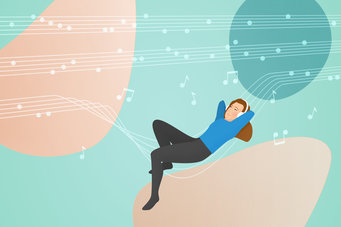Coping with Covid-19 through Music
International study investigates the role of music in regulating emotions in times of crisis
Beyond the immediate health risks of the Covid-19 pandemic, the containment measures it necessitates have brought with them a number of other stressors that can undermine individual and collective well-being. As part of an international research project, the Max Planck Institute for Empirical Aesthetics investigated whether musical engagement is an effective strategy for socio-emotional coping during lockdown.

The project team collected demographically representative samples from six countries on three continents during the first lockdown in April and May 2020. Over 5000 people from Germany, France, Great Britain, India, Italy, and the USA were asked in an online survey about how they engaged with music during the crisis. More than half of respondents reported using music to cope with emotional and social stressors.
“It’s worth noting that music itself wasn’t the coping aid, but rather, music-related behavior, specifically the ways people have adapted their musical behaviors during the crisis. In this regard, music listening and music making appear to provide different coping potentials,” explains Melanie Wald-Fuhrmann, Director of the Max Planck Institute for Empirical Aesthetics.
People who experienced increased negative emotions due to the pandemic were found to engage with music primarily as a way to regulate depression, fear, and stress, especially via music listening. People who reported more positive emotions overall were found to use music largely as a replacement for social interaction. Not just music listening, but also music making gave them a sense of belonging to a community. Making music, moreover, served as a method for self-reflection.
The novel genre of “coronamusic” is especially noteworthy. This term refers to musical responses to the coronavirus crisis, such as newly composed pieces, themed playlists, and famous well-known songs whose lyrics were changed to fit the pandemic. The research team found that the more interested respondents were in coronamusic, the more music listening and making seemed to help them cope emotionally and socially.
These findings underline the importance of real-time creative responses in times of crisis. New coronasongs offered a much-needed opportunity for collective response – and this made them even more useful for strengthening resilience of both the individual and the community. These findings therefore contribute to ongoing debates about the importance of music and culture in society.












